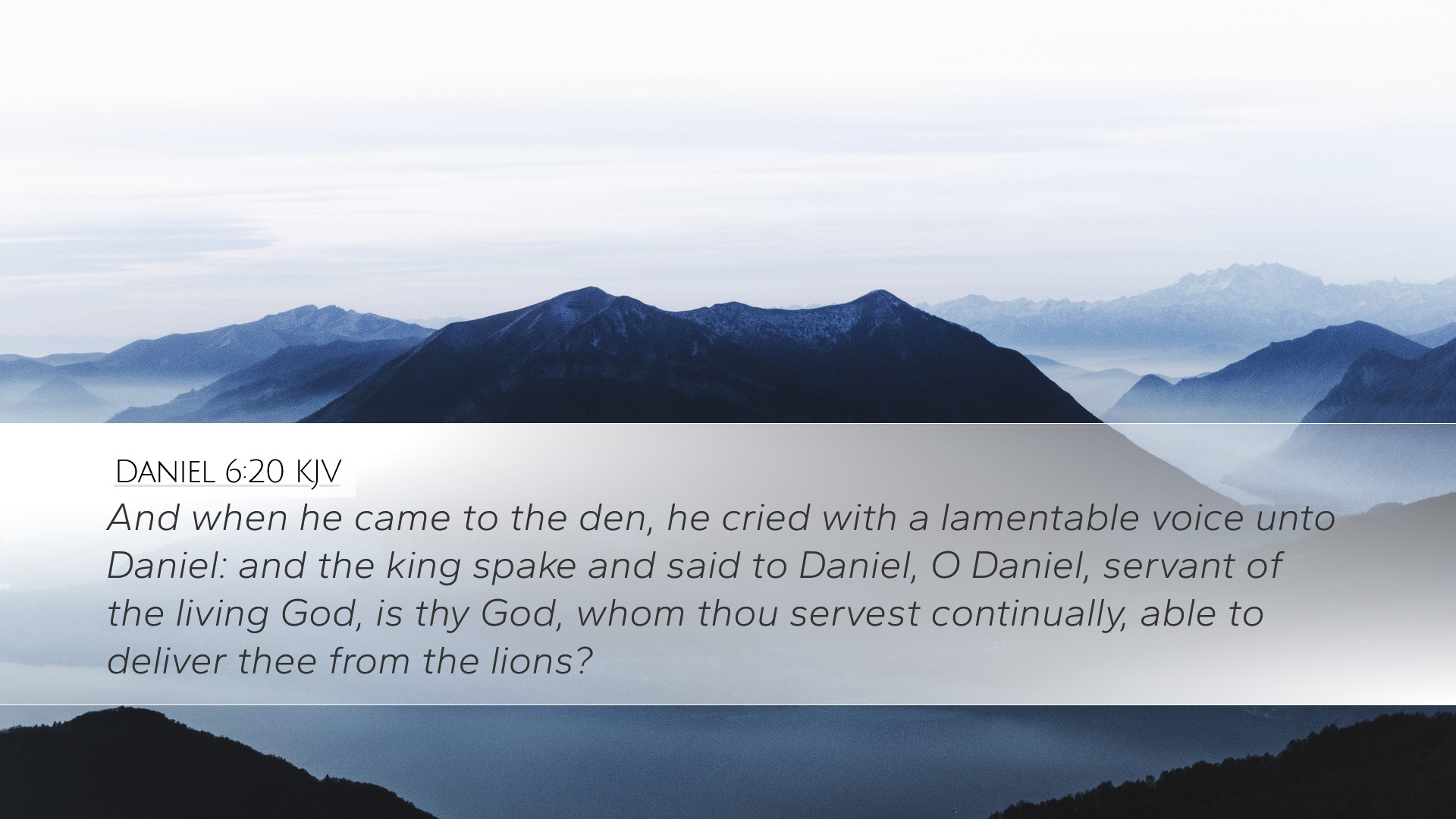Commentary on Daniel 6:20
Daniel 6:20 states: "When he came to the den, he cried with a lamenting voice to Daniel. The king spoke, saying to Daniel, 'Daniel, servant of the living God, has your God, whom you serve continually, been able to deliver you from the lions?'"
This verse occurs after Daniel has been thrown into a den of lions for defying King Darius' decree. The context of this verse is critical, as it encapsulates the tension between faithfulness to God and obedience to earthly authorities.
Exegesis and Contextual Insights
The narrative of Daniel in the lions' den (Daniel 6) is not merely a tale of deliverance, but a profound illustration of steadfast faith in the midst of persecution. The heroine figure, Daniel, illustrates unwavering devotion to God despite the threats posed by earthly powers.
King Darius' Role
Darius is portrayed as a troubled figure in this scenario. Upon realizing the consequences of his law, he exhibits a level of anxiety regarding Daniel's fate, as emphasized by his "lamenting voice." This demonstrates that, despite being a king with authority, Darius is helpless in this situation.
Daniel’s Faithfulness
Daniel’s response to the king’s inquiry reinforces his undying trust in God. His continuous service to the living God sets him apart from others, highlighting the essence of true servanthood. Various commentaries reflect on Daniel's unwavering commitment:
- Matthew Henry: Commented on Daniel’s integrity and how his relationship with God was central to his identity.
- Albert Barnes: Offered insights regarding the significance of God’s ability to deliver, noting that true service to God invites divine protection.
- Adam Clarke: Emphasized the term "living God," contrasting the true God with the lifeless idols worshipped by others.
Theological Implications
The cries of Darius to Daniel serve multiple theological functions. They illuminate the concept of divine sovereignty, revealing that while human authorities may impose restrictions, God’s will ultimately prevails.
Servanthood and Divine Relation
Daniel is addressed as the "servant of the living God," a title that speaks to both humility and exalted status. This highlights the expectation of God’s servants to be clear witnesses of His power.
Additionally, this phrase suggests a relationship grounded in devotion and trust, which is pivotal for all believers, especially in moments of trial. As Darius expresses concern, the implication is that Daniel’s faith provides not only comfort to the king but also confidence in God's protective nature.
The Hope of Deliverance
Daniel’s ordeal culminates in the ultimate test of faith. The inquiry from Darius, "has your God ... been able to deliver you?" resonates with themes of hope and expectation. Here, Darius acknowledges a higher power at work.
The phrase encapsulates the tension between doubt and faith, as Darius, upon hearing the truth, finds hope in Daniel’s response. This is a reflection of human nature, wherein fear can often be transformed into faith when we witness God’s intervention.
Pastoral Reflections
For pastors and spiritual leaders, this verse presents opportunities for rich sermons regarding faith in adversity. Drawing from the rich insights from early biblical commentators allows for a deepened understanding of the text, preparing believers to rely on God even when circumstances appear dire.
Encouragement for Believers
This passage encourages contemporary believers to remain steadfast in their faith, believing that God can and will deliver them from whatever trials they face. Simply put, faith in God should not waver in the face of persecution or earthly trials.
Conclusion
Daniel 6:20 serves as a rich text for exploration of faithfulness, divine power, and the relationship between servant and master. The commentary insights from notable historical scholars deepen our understanding and application of these truths in today’s context.


